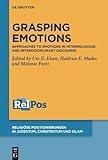Grasping Emotions : Approaches to Emotions in Interreligious and Interdisciplinary Discourse / ed. by Ute E. Eisen, Heidrun E. Mader, Melanie Peetz.
Material type: TextSeries: Religiöse Positionierungen in Judentum, Christentum und Islam ; 4Publisher: Berlin ; Boston : De Gruyter, [2024]Copyright date: 2024Description: 1 online resource (XII, 314 p.)Content type:
TextSeries: Religiöse Positionierungen in Judentum, Christentum und Islam ; 4Publisher: Berlin ; Boston : De Gruyter, [2024]Copyright date: 2024Description: 1 online resource (XII, 314 p.)Content type: - 9783111181035
- 9783111185798
- 9783111185576
- online - DeGruyter
- Issued also in print.
| Item type | Current library | Call number | URL | Status | Notes | Barcode | |
|---|---|---|---|---|---|---|---|
 eBook
eBook
|
Biblioteca "Angelicum" Pont. Univ. S.Tommaso d'Aquino Nuvola online | online - DeGruyter (Browse shelf(Opens below)) | Online access | Not for loan (Accesso limitato) | Accesso per gli utenti autorizzati / Access for authorized users | (dgr)9783111185576 |
Frontmatter -- Foreword to the Series -- Acknowledgments -- Contents -- Introduction -- 1 Contemporary Methodological Perspectives on Emotions -- Selected Avenues to Emotion-Oriented Interpretations of Ancient Religious Texts: Review and Outlook -- Grasping Religiously Connoted Emotions and Sentiments from a Co-Constructivist Emotion Paradigm -- Antisemitism as Cultural Sadism: An Erotohistorical Approach -- 2 Grasping Emotions in Ancient Iconography -- Emotions and Ancient Near Eastern Art: Issues and Methods -- Emotions and Visual Arts, with a Focus on Greco-Roman Artefacts: A Response to K. Sonik -- 3 Grasping Emotions in Religious Authorative Texts of Antiquity -- Emotion Scripts in the Hebrew Bible: A Case of Hate -- Grasping Emotions in Psalm 130: Hermeneutics, Methods, and Issues -- Prophetic Shockvertising: Methods and Ethics of Shock Effects in Amos 3, Isaiah 20, and Ezekiel 23 -- „Und sie fürchteten sich sehr …“: Kognitionswissenschaftliche Erkenntnisse zur Angst und deren Anwendung auf neutestamentliche Texte -- Qur’anic Plot and the Practice of Emotional Virtue, with the Example of Al-Aʿrāf (Q. 7) -- Divine Attributes and Human Emotions: Joseph’s Sentimental Education in Sura 12 of the Qur'an -- 4 Grasping Emotions from Philosophical and Systematic-Theological Perspectives -- Kontrollieren oder Kultivieren der Emotionen? Aristoteles’ Konzeption der Emotionen -- Sprache und Gefühl: Überlegungen zur theologischen Hermeneutik -- Mimesis, Gefühl und Ratio: Anthropologische Mehrdimensionalität und religiöse Tradition: Eine Response zu R. Barth -- List of Authors
restricted access online access with authorization star
http://purl.org/coar/access_right/c_16ec
Emotions have increasingly attracted the attention of the sciences and academia. The topic is all the more timely since we have witnessed a global trend towards highly emotionalized discourses across societies and religions. Discourses are less guided by rational arguments and “facts”. Instead, narratives, sometimes manipulative, influence the thoughts and activi-ties of our societies. In this context, the authoritative texts of the monotheistic religions are experiencing a renaissance. Tanach, Bible and Qur’an do not only “emotionalize”, they also offer ancient concepts of emotions which affect the present.This book brings the interdependencies of antiquity and (post)modernity into an interdisci-plinary discussion. How should we understand feelings at all? This book explores the ap-proaches to emotions as portrayed and understood in various sources and disciplines. The contributors share their perspectives on methodological questions concerning research on the emotions. Scholars in religious studies and theology from different traditions—Jewish, Christian, Islamic—enter into dialogue with other disciplines, such as psychology, literary studies, sociology, cultural studies, philosophy, and historiography.
Issued also in print.
Mode of access: Internet via World Wide Web.
In English.
Description based on online resource; title from PDF title page (publisher's Web site, viewed 20. Nov 2024)


